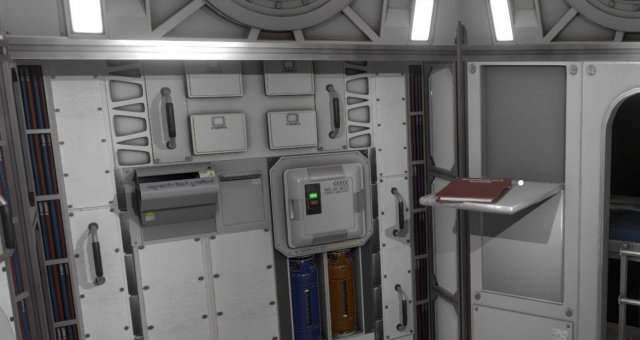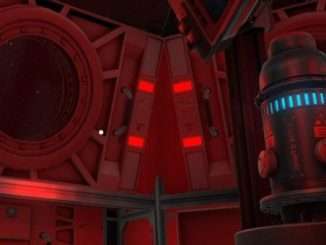
Tired of being baked by the sun? Hate lightning with a burning passion? Need help warming up? Well then this guide is for you! Practical and easy ways to maximize your time in your ship/station!
Cosmic Events Guide for Engineer
Introduction
This guide will cover these so called “events” and list out common and easy ways to get through them as best as you can*!
Each “event” is given a ranking of 1 to 5 for difficulty, 1 being extremely easy and 5 being extremely difficult. Difficulty is based off of:
- Required attention to systems/measurements.
- Damage received to the ship/station.
- Other issues that may arise.
Note: This does not guarantee survival. This guide shall not be held responsible for poor choices made by engineers who read this.
Asteroids: Angry Rocks
This event is categorized as your ship/station drifting into a dense area of asteroids. These asteroids will collide with your ship and may cause damage to your ship/station or hull breaches. Smaller, harmless asteroid chunks and dust will hit against your outer hull harmlessly, but may cause lots of unintended noise, which may drown out any important error sounds. Larger asteroids are more dangerous but thankfully rare. When they hit, they will cause: damage to parts of your ship/station, your lights to flicker off then back on, you to drop any items, and it flings you up into the ceiling.
Asteroids are by far the most damaging event currently known, doing direct damage to system components and causing lots of stress and noise.
When you get a collision warning that a dense asteroid area has drifted into your path, here are some steps you can take:
- If you have no control (like if you are in a escape pod), start by removing any batteries in any systems you have running. Batteries are expensive and damage to them takes lots to repair.
- Open all critical systems for quick access to maintenance for them.
- Set all available screens to show errors for even faster maintenance.
- Once this is done to a satisfactory level, grab onto something and hold on until the violent shaking starts to diminish*. Hitting your head is very bad and can damage components even more.
* – If you are feeling brave or a critical system is damaged, you can attempt to try and repair system while still in the event, but caution should be taken as the shaking and hard hits may make it hard to move around.
In the aftermath, you should quickly look at critical systems to make sure there are no issues to be fixed, then move to secondary.
Difficulty: 4 (Violent shaking, Loud Noises, Direct Damage, Physically thrown around).
Freezing Nebula: Colder then Cold
A freezing nebula is a abnormally cold and dense cloud of ice particles and dust that will lower your ship/station temperature and freeze over the windows. It will also lower your main generator’s temperature to a pitifully low level, making it very hard to keep power. Luckly for you however, most Temperature Regulators can keep your atmospheric temperature perfectly safe, the issue is more so power.
To safely pass a freezing nebula, it’s relatively simple. You can turn off enough system to maintain low power to a select few and/or use batteries to supplement the lack of power.
Recommended systems to keep powered: Temperature Regulator
Difficulty: 1.5 (Basic Power Management, Very Basic Temperature Management).
Electromagnetic Storm: Simply Shocking
A electromagnetic storm is basically a thunderstorm in space, including the lightning and thunder… and power flashes. Frequent lightning strikes onto your ship/station will cause damage to electrical components, overloading them very quickly unless precaution is taken. It is very easy to fry your whole ship/station when encountering one, so you should take this one very seriously.
Once you encounter electromagnetic disturbances, you must move quickly to do the following:
- For non-essential system, simply turn the system off.
- For essential systems:
- Turn them off.
- Remove their Power Connector until the disturbance passes.
- Insert a Battery.
- Turn system back on.
Difficulty: 2.5 (Advanced Power Management, Electrical Damage).
Star Flyby: Hot Hot Everything
Sometimes, your course will take you on a flyby nearby to a star. Getting too close will raise the temperature of your ship/station as well as quickly raise the temperature of your main generator. The solar wind and magnetic interference coming off the star will also disrupt communications and cause loud static to play.
Flying close to a star should be avoided, but if you find your self near one, here is what you should do:
- Make sure your Temperature Regulator is in operational and in good condition.
- Quickly turn off your main generator, as it making heat plus the star will quickly turn your ship/station into a oven.
- Use batteries and only batteries for power until the heat stops rising.
The heat will continue to rise even with the main generator off, however if you act fast enough, the heat will not rise to dangerous levels, but it may still get uncomfortably warm for the duration of the flyby.
Difficulty: 3 (Temperature Management, Loud Noises).
Black Hole: Gravity Sucks
Black Holes are impossibly dense singularities that have gravity so strong it can pull in light, thus making them the darkest objects in the universe. This intense gravity also has a effect on your pod, increasing or decreasing the pressure exerted on it, changing the internal pressure requirements.
Your first encounter with the beasts of the universe may be challenging, but it’s not impossible and not as hard as come claim it is, it just requires a lot of attention and watching numbers. Here’s how you tame the beast:
- Make sure your Oxygen, Carbon Dioxide, and Nitrogen gas system are working as best as they can.
- It is of upmost importance that you focus on the pressure readout from the Nitrogen gas system, as this is your only reliable and easy way to read your pressure through this event.
- If the pressure is rising, and the Nitrogen system cannot contain it, turn off your Oxygen system until it starts lowering. This sounds counter-productive, but at higher pressure you require less oxygen, so it balances out.
- If the pressure is rising too fast still, you may elect, in a emergency, to open a airlock to vent some pressure out into space. This should only be a emergency move. Please do not open the airlock under any other circumstances!
- If the pressure is lowering, and the Nitrogen system cannot contain it, turn off your Carbon Dioxide system until it starts raising. This sounds counter-productive, but at lower pressure you require more oxygen, so it balances out.
- If the pressure is lowering too fast still, you may elect, in a emergency, to open one of your Oxygen or Carbon Dioxide containers to quickly raise the pressure, just quickly close it afterwards. This should only be a emergency move. Please do not open the containers under any other circumstances!
Difficulty: 4 (Advanced Pressure Management, High Attention Required).



Be the first to comment